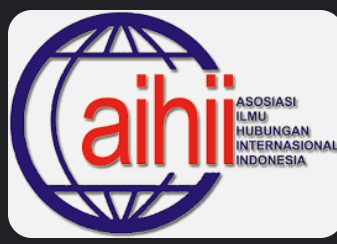About the Journal
Focus and Scope
This journal accepts the focus of international relations, consisting of:
1. International security
2. International political economy
3. Foreign Policy and Diplomacy
4. international relations and Regional Autonomy
5. Contemporary international relations Issues
6 international relations theory and met methodology
Peer Review Process
Each manuscript submitted to the editorial office will be chosen after an initial examination by the Editorial Board. The material will then be distributed to peer-review partners before the review process starts. At least two (two) peer reviewers will each evaluate one manuscript. The articles will be sent out for peer review, reviewed by peers, and then sent back to the authors for correction. The reviewers offer constructive criticism that strengthens the manuscript's content in a scientifically beneficial way. Each paper will be evaluated by at least 2 peer reviewers for content. Peer reviewers who work closely with "Mandala: Jurnal Ilmu Hubungan Internasional" are experts in the advancement of international relations fields. Their publications are distributed both locally and abroad, and they have management experience with well-known periodicals.
Publication Frequency
Mandala: Journal of International Relations published in January-June and July-December each year. Manuscripts sent via online
Open Access Policy
This journal is an open access publication that provides readers and their institutions with immediate, worldwide, barrier-free access to the full text of all published papers. Every article in the Journal may be read, downloaded, copied, distributed, printed, searched, or linked to by readers.
This publication allows direct access to its content on the premise that making research freely available to the public would improve global knowledge exchange. We are continuously working with our author communities to select the best choice of license options.
Publication of Mandala: Jurnal Ilmu Hubungan Internasional
This statement clarifies the ethical behavior of all parties involved in the act of publishing a manuscript in Mandala: Journal of International Relations, managed by the Faculty of Social and Political Sciences, UPN Veterans Jakarta, including writers, editors, and reviewers.
This statement is based on COPE’s Best Practice standards.
1. Ethical Guidelines for Journal Publication
The publication of a manuscript is very important to consider related to its ethics, this also refers to Mandala: The Journal of International Relations publishes the results of both theoretical and empirical studies from various author sources which can be accounted for. This is important for the development of knowledge to be implemented in developing the economy of a country. For this reason, in order for a knowledge network to be coherent and respected, it needs to be done in the Ethics Guidelines for Journal publications. This is a direct reflection of the quality of work of the authors and supporting institutions. After submitting the manuscript, a peer review will be conducted to support and realize the scientific method. It is then important to agree on the standards expected of ethical behavior for all parties involved in the act of publishing, namely: writers, journal editors, reviewers, publishers and the public.
The Faculty of Social and Political Sciences, UPN Veteran Jakarta, as the publisher of Mandala: The Journal of International Relations takes its guardianship over all the very serious publishing stages and we carry it out with ethics and other responsibilities. The Faculty of Social and Political Sciences of UPN "Veteran" Jakarta is committed to ensuring that broadcasting, reprinting or other commercial income does not have an impact or influence on editorial decisions.
2. Publication Decisions
Before publishing both Online and Print for Mandala: Journal of International Relations The Chief Editor in charge of publishing requests input from other editors as well as supporting advice from reviewers. Where, it is also based on a series of journal publications starting with submission of manuscripts, checking of editors, checking of reviewers, checking of layouts, checking of plagiarism and copyrights. This was under the supervision of the Chief Editor and other Editors with authority, so that a publication decision emerged for the manuscript on Mandala: Journal of International Relations
3. Non-Discrimination
In each Mandala publishing process: Journal of International Relations, the editors and reviewers evaluate the manuscript for the scientific content of the manuscript without relating to race, gender, sexual orientation, religious beliefs, ethnic origin, citizenship, or political philosophy of the author. This is done in order to hold the ethics of publishing Mandala: Journal of International Relations namely non-discrimination.
4. Confidentiality
The manuscript published in Mandala: Journal of International Relations is very much preserved, wherein the editors and reviewers are not permitted to disclose much information about a manuscript that has been submitted to anyone from the authors, reviewers, editorial team, and publishers, but only accordingly and naturally.
5. Disclosure and Conflict of Interest
Unpublished material disclosed in a manuscript submitted does not have to be used by many members of the editorial board and reviewers in his own research.
Duties and Obligations of Reviewer
1. Contribution to Editorial Decisions
Publication of manuscripts on Mandala: Journal of International Relations involving reviewers in their fields, the decision of the reviewer as a contribution to the editor's decision for each manuscript. Mandala: Journal of International Relations uses a blind-review process, where the results of the reviewer are communicated back to the author to improve the quality of the authors' research.
2. Speed
Mandala: Journal of International Relations is very concerned about the timeliness of publications and information on the author. Every text that goes to Mandala: Journal of International Relations is informed to the author and reviewer for the process as the basic provisions. If the reviewer does not carry out his task on time, then the editor takes the decision to replace another reviewer of higher quality. In order to keep the publishing time, it is consistent with what is stipulated.
3. Confidentiality
Mandala: Journal of International Relations is managed by the Faculty of Social and Political Sciences UPN "Veteran" Jakarta with the help of expert editors and reviewers. Every text that is entered, is kept confidential by both the editor, reviewer and publisher. Considering the system of blind-reviewers, each script that enters reviewers can only be discussed with the content of the manuscript editor and writer.
Duties and Obligations of the Author
1. Reporting Standards
The authors are required to provide accounting data and informative information on the work provided to Mandala: Journal of International Relations. The data presented contains reference sources that can be accounted for and contained in the manuscript. Fraudulent or intentional inaccurate statements are unethical and unacceptable behavior.
2. Data Access and Retention
The authors may be asked about the data and information on the manuscript, so they are required to provide data and information related to the manuscript on time to the editor and reviewer. This is to facilitate the refinement of the manuscript in accordance with the rules of the Mandala Journal: Journal of International Relations
3. Originality and Plagiarism
Writers should ensure that they have written a fully original work, and if the writers have used the work and / or words of other people's work, then it must be properly quoted. If there are several problems related to quotation and / or plagiarism in the author's work, then the script is automatically rejected.
4. Multiple, Redundant or Concurrent Publication
When the authors submit the manuscript for publication in the Mandala Journal: Journal of International Relations, the author is not permitted to send the manuscript to other publishers simultaneously. Simultaneous submissions from the authors are considered unethical and unacceptable for the manuscript.
5. Recognition of Resources
Every manuscript sent by the author in the Mandala Journal: Journal of International Relations must provide acknowledgment of appropriate sources and be able to add value to the manuscript, all such confessions must be clearly stated in the reference list.
6. Research Authorship
Authorship should be limited to those who have made a significant contribution to the research reported in the manuscript sent to Mandala: Journal of International Relations. The authors listed in the manuscript have a mandala responsibility: The Journal of International Relations is responsible for keeping the co-authors posted with the review process. If accepted, all authors are required to provide a signed statement that the research work is their original research work.
7. Dangers and Subjects of Humans or Animals
If the work involves chemicals, procedures or tools that have many unusual hazards inherent in the use of the author, they must clearly identify all of these in the text.
8. Disclosure and Conflict of Interest
All writers should express in their manuscript everything that supports their research is completed. All supporters of financial resources for research should be disclosed.
9. Fundamental Mistakes in Published Works
When an author discovers a significant error or inaccuracy in a published work, the author's obligation is to immediately notify the editor or publisher of the journal and work with the editor to withdraw or correct the research.







